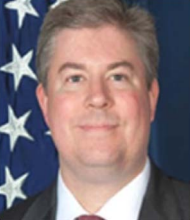
The U.S. Immigration and Customs Enforcement’s (ICE) Office of the Principal Legal Advisor (OPLA) is the largest legal program in the Department of Homeland Security (DHS) with more than 1,100 attorneys. Pursuant to statute, OPLA serves as the exclusive representative of DHS in removal proceedings before the Executive Office for Immigration Review (EOIR) litigating cases involving criminal aliens, terrorists, human rights abusers and other priority aliens.
OPLA also provides a full range of legal services to ICE programs and offices. It provides legal advice and prudential counsel to ICE personnel on their customs, criminal and immigration law enforcement authorities, the Freedom of Information Act and Privacy Act, ethics, legal liability under the Federal Tort Claims Act, and a range of administrative law issues, such as contract, fiscal and employment law. In addition to its headquarters in Washington, D.C., OPLA has 26 Offices of Chief Counsel with a presence in more than 60 locations throughout the United States.
In response to ICE Acting Director Tom Homan’s designation of OPLA as an integral enforcement program with ICE, the Office of Public Affairs (OPA) created “OPLA Week,” which begins Oct. 30, and will conclude Nov. 3. For this designated five-day period, the men and women of OPLA will be on full display. Through text, photos and video, OPA will showcase the nation’s foremost legal experts on immigration and customs law, highlighting their service to their country and commitment to supporting ICE’s mission.
Know Your Leadership: Principal Legal Advisor Tracy Short

OPLA Week Spotlight: Michael Davis, Executive Deputy Principal Legal Advisor
As a senior in high school, Michael P. Davis, U.S. Immigration and Customs Enforcement’s (ICE) Executive Deputy Principal Legal Advisor, took a college visit to John Carroll University, just east of Cleveland.

Having spent his formative years in the Chicago suburbs, Davis was looking for schools in the Midwest in order to stay relatively close to his family. During his visit, while learning about the campus and the different programs the school offered, he was struck by the beauty of Grasselli Tower illuminated at night, the now 85-year-old bell tower that is the most notable landmark on campus.
It was that image that sealed his decision.
“I looked out and saw it lit up at night and thought to myself ‘I wouldn’t mind spending some time here,’” Davis recalls.
Pursuing a legal career was a natural fit. Davis majored in political science and Spanish, while earning a minor in philosophy “just for fun.” He was a natural, having developed a vested interest in history, government and learning how the American and other political systems worked. But like many college students, Davis enjoyed his classes, not knowing where they would lead him.
While many of his friends and classmates had clear postgraduate plans, Davis wondered what he could do with what he was learning.
“What I was studying was making me a better citizen and more informed with what was going on in the world,” Davis said, “but I wasn’t sure what was going to be next.”
What he was sure about was that public service and government service was appealing. During his junior year at John Carroll, Davis spent a semester in Washington, D.C., as an intern for the U.S. Department of State. There, he met people who inspired him to pursue a legal career. Davis ultimately decided to attend the University of Illinois College of Law.
In law school, students find areas of law that interest them. For Davis, he took bankruptcy and tax law classes, among others, but public service remained his goal. His experiences studying foreign political systems and interning for the State Department had sparked thoughts of one day serving as a U.S. ambassador overseas. That commitment to government service led Davis to apply to the Attorney General’s Honors Program, an entry-level federal attorney recruitment program. Davis interviewed with and was hired by the former Immigration and Naturalization Service (INS).
“That’s how I got the job,” Davis said, who felt that working for the INS complemented his international interests well. “When you read about immigration law, you hear that immigration law derives from the government’s foreign affairs power. It relates to our sovereignty as a country.”
The young Midwesterner who had only lived in Northern California briefly as a small child, began his career with INS in Los Angeles in Sept. 2000.
“The thing that hit home was how bright it was. It was always sunny,” Davis recalled of moving to Southern California. “You wake up every day to warm weather and palm trees. You start to see these landmarks and places you see on television, so the first year you’re star struck.”
Davis enjoyed his experiences outside of work and everything Los Angeles had to offer. At work, he developed a fondness for asylum law, litigating thousands of cases during his time in California. In three years in Los Angeles, Davis received a good introduction to asylum law, but to him, in order to become the government’s expert in a particular area and work on issues on a national stage and really “get into the weeds,” he needed to be at headquarters.
Ultimately, Davis interviewed for a job at INS headquarters in the general counsel’s office. In early 2003, he moved to Washington. His division at INS went over to U.S. Citizenship and Immigration Services after the merger where he could continue to satisfy his love for asylum law. In 2005, Davis rejoined his colleagues at ICE, working on asylum issues as an attorney in OPLA’s Immigration Law and Practice Division.
“As an asylum lawyer, I had opportunities to interact with officials from international organizations and representatives of foreign governments, and even got to implement an international agreement on cross-border asylum issues. I loved asylum law, but it was time for me to do something different and get some more exposure,” Davis said, reflecting on his transition to a supervisory position with OPLA in 2007. “I can’t say that when I came to headquarters that I ever wanted to get to management.”
Several management jobs later, Davis serves as the senior career lawyer at ICE. In this role, Davis supports the Principal Legal Advisor in maintaining oversight of OPLA’s vast legal program, which represents DHS in removal proceedings before the immigration courts and Board of Immigration Appeals, provides legal advice and training to ICE officers and special agents on a myriad of administrative and operational law issues, and coordinates with the Department of Justice to defend ICE’s interests in complex federal litigation.
As Davis has learned since his days at John Carroll, age brings experience. He’s also learned that with a job that requires a lot of time and energy, balance is key. The birth of his twins, Greg and Emily, in 2015, has helped him seesaw between spending time at home and in the office. He passes the lessons learned on to the next generation of lawyers, speaking to both new OPLA attorneys and law students just getting their start just as he did when he first caught a glimpse of the Grasselli Tower.
One of those lessons is one he’s lived by to this day.
“Life is going to close plenty of doors in your face, so don’t close any on your own. You never know where the opportunity you availed yourself of will lead.”




















